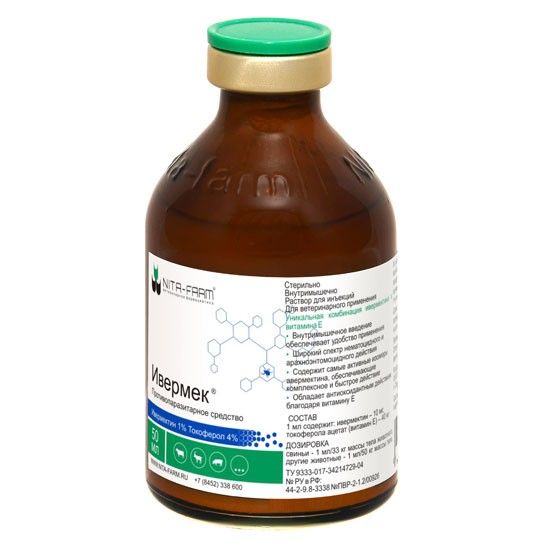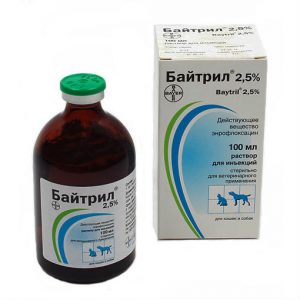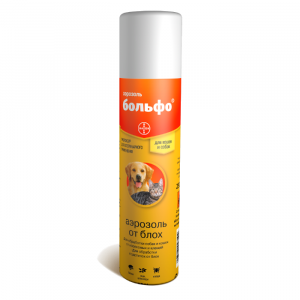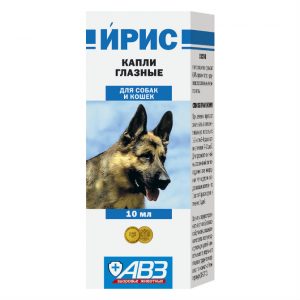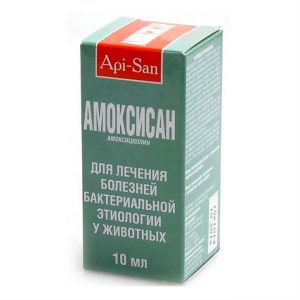Description
Pharmacological action of
Ivermek belongs to the antiparasitic systemic drugs of the class of macrocyclic lactones.
Ivermectin, which is part of the drug, has a pronounced antiparasitic effect on the larval and sexually mature phases of the development of nematodes of the gastrointestinal tract, lungs and eyes, larvae of subcutaneous, nasopharyngeal, gastric gadfly, lice, bloodsucker and sarcoptic mites.
The mechanism of action of ivermectin is its effect on the value of the current of chlorine ions through the membranes of nerve and muscle cells of the parasite. The main targets are glutamate-sensitive chlorine channels, as well as gamma-aminobutyric acid receptors. A change in the current of chlorine ions disrupts the conduction of nerve impulses, which leads to paralysis and death of the parasite.
After parenteral administration of the drug, ivermectin is rapidly absorbed from the injection site and distributed in the organs and tissues of the animal, providing a parasiticidal effect for 10-14 days. It is excreted from the body of animals with urine and bile, in lactating animals also with milk.
According to the degree of exposure to the body according to GOST 12.1.007-76, Ivermek is classified as ² Ñmoderately hazardous ² Ñ (hazard class 3), the active substance – ivermectin is classified as ² Ñextremely hazardous ² Ñ (hazard class 1). In recommended doses, the drug does not have embryotoxic, teratogenic and mutagenic effects, it quickly collapses in the external environment. The drug is toxic to bees, as well as to fish and other aquatic organisms.
Indications
Ivermek is prescribed for animals with therapeutic and prophylactic purposes in case of arachno-entomoses and nematodoses: – cattle in case of strongylitis, trichocephalosis, strongyloidosis, oleophorosis, psoriasis, hypoderma , mulleriosis, hematosis, ostertagiasis, nematodirosis, marshallagiasis, cooperiosis, esophagostomiasis, bunostomiasis, trichocephalosis, strongyloidosis, melophagosis, estrosis, psoroptosis and haberthiosis srdlk dic Ocauleza ostertagiasis, nematodiroze, strongyloidiasis, trihotsefaleze, edemagenoze, tsefenomioze and sarcoptic mange
– camels at dictyocauliasis, ostertagiasis, nematodiroze, strongyloidiasis, and sarcoptic mange trihotsefaleze
– pigs at trihotsefaleze, ascariasis, metastrongylosis, ezofagostamoze, strongyloidiasis, stefanuroze, gematopinoze and sarcoptic mange.
Contraindications
Contraindication to the use of the drug Ivermek is the individual hypersensitivity of the animal to the components of the drug (including a history). It is not allowed to use the drug for patients with infectious diseases and malnourished animals, pregnant females, whose milk will be used for food purposes less than 28 days before the start of lactation.
Composition
Injection solution in 1 ml as active ingredients contains: ivermectin – 10 mg and tocopherol acetate (vitamin E) – 40 mg, as well as excipients: diethylene glycol monoethyl ether, polyoxyethylene-35 castor oil, benzyl alcohol, water for injection.
Dosage and administration of
Ivermek is administered once intramuscularly following aseptic rules: for pigs in the neck or inner thigh area, for ruminants in the croup or neck in the following doses: – for cattle, sheep, goats, deers and camels – 1.0 ml per 50 kg of animal weight (200 μg of ivermectin per 1 kg of weight)
– for pigs – 1.0 ml per 33 kg of animal weight (300 μg of ivermectin per 1 kg of weight).
In severe cases of animal disease with sarcoptosis, treatment is performed twice with an interval of 8-10 days.
If the volume of the injected solution is more than 10 ml, it should be administered to the animal in several places.
The treatment of animals against nematodoses is carried out in the autumn before setting up for stalling and in the spring before entering the pasture, against gadfly infestations – immediately after the end of the flight of gadfly, against pathogens of arachno-entomoses – according to indications.
Each series of the drug is pre-tested in a small group (7-10 animals). In the absence of complications within 3 days, they begin processing the entire livestock.
Ivermek should not be used simultaneously with drugs containing macrocyclic lactones, due to the possible mutual enhancement of the toxic effect.
Peculiarities of the action of the drug during its first use and withdrawal have not been identified.
Storage conditions
Store Ivermek in the manufacturer s sealed packaging, separately from food and feed, in a place protected from direct sunlight, at a temperature of 0 ° C to 25 ° C.
Ivermek should be kept out of the reach of children.
Shelf life
Shelf life of the drug, subject to storage conditions in the manufacturer s sealed packaging, is 2 years from the date of manufacture, after the first opening of the primary packaging – no more than 42 days. After the expiration date, Ivermek should not be used.
Active ingredient
Ivermectin
